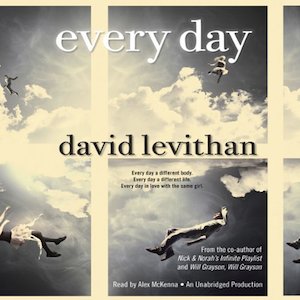 Every Day (Every Day #1) by David Levithan • read by Alex McKenna for 8 hours 25 mins • published 28. August 2012 by Listening Library • classified as Fantasy, Romance, Young Adult • obtained through Overdrive • read as audiobook • shelve on Goodreads
Every Day (Every Day #1) by David Levithan • read by Alex McKenna for 8 hours 25 mins • published 28. August 2012 by Listening Library • classified as Fantasy, Romance, Young Adult • obtained through Overdrive • read as audiobook • shelve on Goodreads • shelve on The StoryGraph
Synopsis:
Every day a different body. Every day a different life. Every day in love with the same girl.
There's never any warning about where it will be or who it will be. A has made peace with that, even established guidelines by which to live: Never get too attached. Avoid being noticed. Do not interfere.
It's all fine until the morning that A wakes up in the body of Justin and meets Justin’s girlfriend, Rhiannon. From that moment, the rules by which A has been living no longer apply. Because finally A has found someone he wants to be with—day in, day out, day after day.
Such Beauty in the Prose
If there is one thing I adored about Every Day, it’s the prose. The prose was so fluid, it bordered on poetic. It captured many of the ideas so beautifully, it was nothing short of thought-provoking.
The moment you fall in love feels like it has centuries behind it, generations—all of them rearranging themselves so this precise, remarkable intersection could happen.
Thought-Provoking Ideas
Existentialism
David Levithan presented so many ideas in Every Day, I still can’t wrap my mind around them all. Take A, who switches bodies every day. While these bodies match A’s age, gender is of no concern. In other words, A is genderless. One day A is male, the next A is female but these are just physical realities that do not reflect A’s being.
What matters above all is that A exists. These are things Rhionnan has to grapple with. She has to come to terms with A changing bodies every day, yet accepting that A is the same person yesterday, today, and tomorrow, regardless of whom he looks like.
Every day I am someone else. I am myself—I know I am myself—but I am also someone else.
It has always been like this.
Identity
Needless to say, a lot of questions about identity arise as well. Who is A? What is A? Where does A come from? How is A’s path determined? Can A truly be the same in the body of a footballer as in the body of a depressed girl? What becomes of the people whose body A takes over for a day?
Not all Questions Have Answers
Every Day does not necessarily answer all these questions but it does make readers think. The premise of the book also raised the idea that even though humans are made up of the mind, body and soul, these entities can very well be separate. Yet they each exercise a great deal of influence on one another.
These notions particularly intrigued me because of the diversity of bodies and lives A steps into, and how A manages to act like the people whose lives are taken over, all while maintaining that separate identity of A.
What Held Back ‘Every Day’
Beyond the beautiful prose and the philosophical aspects in Every Day, I enjoyed the budding romance between Rhionnan and A. As much as I’m not the biggest fan of love triangles, I think in the case of Every Day there was good reason for Justin to be part of the story, so I didn’t mind the love triangle too much. Although it did hinder me from fully enjoying Every Day. View Spoiler »
Also, as much as I was always curious where A would end up next, I felt that after a while the conflict remained stagnant. The conflict doesn’t vary all too much from day to day, so for me what made an impact was Levithan’s writing style and all the philosophical potential of Every Day, rather than the story itself.
Enjoyment Factor
Whatever it is, I liked Every Day a lot. Alex McKenna wonderfully narrated A’s story and I could completely lose myself in the audiobook. Listening to the book completely immersed me into A’s reality and I’m sure I’ll be thinking about Every Day for a long time to come.

I’m so, so happy you enjoyed this one! I read it recently as well, and had a lot of the same feelings as you. I think you summed it up perfectly that while there were times where the story was stagnant, the prose is so beautiful that it makes up for the areas where the story isn’t as strong. One of the things I loved most about this book (and Levithan in general), is that difficult questions/ideas are tackled, such as identity and existentialism. I know these are things that everyone worries about, but they’re definitely things *I* think about, so it’s always interesting to see somebody else explore that.
Yes, the prose indeed is very beautiful. I wonder if other Levithan books are like that too. I loved Dash & Lily’s Book of Dares but he co-wrote that, so it’s a little different, I feel.
I think things like identity and existentialism are important ideas to grapple with but sadly not everyone wants to read about these things. But like you, I like it when they’re explored in fiction.